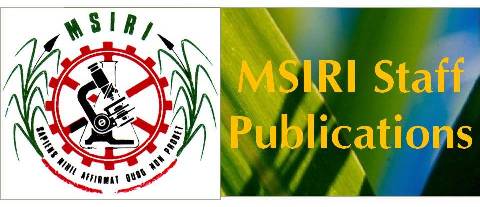Status of sugar industry in Mauritius: Constraints and future research strategies
| MSI04P4102 | |
| Ng Kee Kwong, K. F. | |
| Status of sugar industry in Mauritius: Constraints and future research strategies | |
| Li, Y. R. and Solomon, S. (eds), Sustainable Sugarcane and sugar production technology: Proceedings of the International Symposium on Sustainable sugarcane and sugar production technology, Nanning, Guangxi, China, November 29 to December 2, 2004. Beijing: China Agricultural Press. 769 p. | |
| book chapter | |
| 2004 | |
| p. 23-27 | |
| Also published in Sugar Tech 7 (1): 5-10, 2005 | |
| En | |
| En | |
| Sugar cane is presently cultivated on 72 000 hectares, representing 85 percent of the arable land in Mauritius. On average, 600 000 tonnes sugar is produced annually with most (530 000 tonnes) of the sugar being exported to the European Union. Domestic consumption of sugar is about 40 000 tonnes per year. The success of the sugar industry in Mauritius has to a significant extent been due to the preferential trade agreements that the country benefited successively from the United Kingdom and from the European Union. The stable revenues from sugar exports have served to develop not only the local sugar industry but have also fostered the diversification of the Mauritian economy, with rapid growth during the 1980s and 1990s of tourism, financial services and manufacturing industries geared towards export. The share of sugar production in the Mauritian economy has consequently over the years and in relative terms dwindled to about 3.5 percent of the gross domestic product in 2003 (from 25 percent in the 1970s). Sugar production nevertheless remains an important contributor to the country's economy with sugar exports still representing about 19 percent of foreign exchange earnings. In the face of the new economic order which is taking shape and stronger competition on the traditional markets to which Mauritius exports its sugar, a lowering of prices now obtained for Mauritian sugar is inevitable in the short to medium term. To survive the Mauritian sugar industry must strive to be more competitive. At present, the cost of cane sugar production in Mauritius is among the highest due to a low milling capacity (3700 tonnes cane crushed per day by the 11 existing mills), a short milling season (an average of only 132 days per year), a high ratio of labour to total production costs with field labour making up 80 per cent of the total labour costs. The rockiness in some 40 000 hectares of sugar cane lands hindering the adoption of mechanized cultural practices is also a constraint to sugar production in Mauritius. In addition, though Mauritius is a well-watered island with an average annual rainfall of 2500 mm per year the uneven distribution of that rainfall coupled with high rates of evaporation (1870 mm annually in the northern and western coastal areas) give rise to a moisture deficit of moderate to severe degree and sustained production is not possible without irrigation in the coastal regions. To enable the sugar cane industry of Mauritius to survive, research strategies must be aimed at both decreasing production costs of sugar while at the same time increasing productivity per unit of resources. Those research strategies encompass all the scientific disciplines of agronomy, namely irrigation, nitrogen nutrition, cultural operations and also includes research and development on mechanisation of cultural practices, breeding of high yielding varieties with high sucrose and fibre content, with good ratooning potential for sustainable production levels. | |
| Sugarcane production costs sugar industry derocking irrigation plant nutrition fertilizers nitrogen breeding mechanization | |
| Mauritius | |
| Sugarcane | |
| General | |
| 2004-12-17 | |
| En | |
| CHEM | |
| CAT | |
| CHEM |
